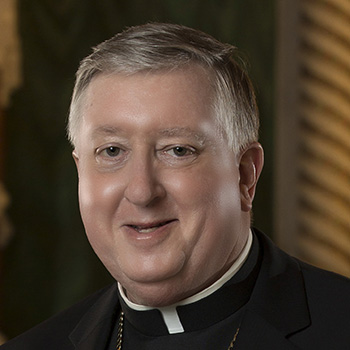SERVE THE LORD WITH GLADNESS | The month of May begins with a focus on newness
Feast days, Scripture readings and All Things New all bring the theme to mind

Dear brothers and sisters in Christ,
We move into May this week.
On May 1, we celebrate the feast of St. Joseph the Worker. In addition to the fact that it’s a new month, there are three other kinds of “newness” associated with this feast.
First, Joseph is associated with a new intervention of God in salvation history — the Incarnation.
Second, Joseph and Mary bring a new kind of marriage and a new kind of fruitfulness into the history of God’s people. St. John Paul II pointed this out in his Theology of the Body audiences when he said: “The marriage of Mary with Joseph (in which the Church honors Joseph as Mary’s spouse and Mary as his spouse) conceals within itself, at the same time, the mystery of the perfect communion of persons, of Man and Woman in the conjugal covenant, and at the same time the mystery of this singular ‘continence for the kingdom of heaven’: a continence that served the most perfect ‘fruitfulness of the Holy Spirit’ in the history of salvation. Indeed, it was in some way the absolute fullness of that spiritual fruitfulness, because precisely in the Nazarene conditions of Mary and Joseph’s covenant in marriage and continence, the gift of the Incarnation of the Eternal Word was realized” (Theology of the Body, 75.3).
Third, because the feast of St. Joseph the Worker was a new feast in the Church. It was instituted in 1955 by Pope St. Pius XII to provide an alternative to Communist “May Day” celebrations. Newness abounds in the background of this feast day!
This week’s readings also highlight new things. For example, we hear about the entry of the Gentiles — as Gentiles — into the people of God. That was new and unexpected in the early Church! We also hear how, at Antioch, the new name of “Christians” was first used to describe disciples. Newness abounds in the readings this week!
On May 2, we celebrate the feast of St. Athanasius. Athanasius was the great defender of a new term in Church history, one that stands at the heart of the Creed. The term in Greek was “homo-ousios.” We’re more familiar with the English equivalent, consubstantial. This term was crucial in responding to the error of Arianism, which held that Jesus was not truly divine. If Jesus was not truly divine, that would mean that He couldn’t really be the savior! So you could say that this new term was pretty important for our faith.
Everywhere we turn this week newness abounds: a new month; feast days for which ‘newness’ is in the background; readings that emphasize new things in the early Church.
And all of that is on my mind because, at the end of the month, I will announce two new things.
First is the parish plan for All Things New. That, perhaps, is the main thing people are focused on. But just as importantly, in my mind, I’m going to have some things to say about what I think a new evangelization could mean for our parishes. To be clear: I’m not going to set out a complete program, a “how to” kit with complete instructions. But I do want to kick-start the conversation in a substantial way because this, the new evangelization, is what parish restructuring is meant to serve.
As we begin the month with a focus on new things, I look forward to sharing new things with you at the end of the month as well.




